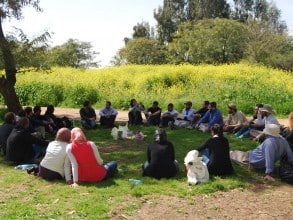The Archbishop of Uppsala of the Church of Sweden, Antje Jackelén, is an inspirational religious and environmental leader – one who preaches in favor of the planet. Long before becoming the first female archbishop, she held strong ethical stances. She long believed and declared that the destruction of the world’s environment is not just, stating that “we must, can and should care for Creation and about Creation.” Archbishop Jackelén is part of a growing number of clergy actively calling for their faith communities to understand how justice for the environment is part of faith, widely quoted as saying “The question of justice is at the heart of the Christian Church” in 2014.

Archbishop Jackelén was surrounded by aspects of both Christianity and nature as a child, growing into her beliefs and interests as time passed. After a childhood experiencing the move between personal food gardens to industrialized food production and personal flower gardens, she wrote her dissertation on “Time and Eternity: The Question of Time in Church, Natural Science and Theology”, and later served as director for the Zygon Center for Religion and Science. After becoming the Archbishop, she clearly linked both, stating that climate change is “utterly an existential and religious question, and we should address it as people of faith. And we should ask the question: What really is realistic to hope for?”1 Secured with her strong belief in religion and a respect for the environment, the Archbishop began to get involved with environmental stewardship, recognizing that there is a necessary relationship between science and Christian Creation. She states that “Science helps us to say ‘Well, we are part of this all – we are not humans and there is the rest of Creation. We are part of the Creation.’” There have been others to encourage this connection, including the Swedish poet Gunnar Edman who Archbishop Jackelén draws inspiration from; Edman once made a “passionate plea to pastors and theologians to not close their eyes to the development of science.”
Recognition of the importance of finding an intersection between religion and the environment has made its way past the Archbishop and into the whole Church of Sweden. As the Archbishop explains, the Church of Sweden has a variety of endowments and investments in land, business and more. The Church has continued to make more environmentally-friendly decisions in regard to these investments. For instance, about a decade ago, the Church divested from fossil fuel companies, recognizing that “there is no future, really, in fossil fuels…because it’s not good for the environment.” This divestment also served as “a way of framing hope, of making hope practical” because it was followed by an investment in sustainable businesses that were both ethically and economically sound for the Church. Hope is a powerful message for the approximately six million members of the Church of Sweden who make up a majority of Sweden’s population. As “over 95% of [Swedish citizens surveyed] said that the use of tax money for addressing climate change was either “Very important” or “Fairly important”” and that “a little over half of the respondents were willing to change the use of hot water, electricity consumption and travel arrangement in order to reduce the impact of climate change”2, the Church of Sweden is aligning itself with a major concern and opportunity for local faith communities.
One specific investment that the Church of Sweden has undertaken is protecting forests in Sweden. In 2000, the Church pledged a Sacred Gift of “certifying 15 per cent of its forests – more than 100,000 hectares – as sustainably managed under the Forestry Stewardship Council guidelines. It also permanently designated one twentieth of forests in all 13 of its dioceses as protected areas.”3 However, by just 2003, they already increased that number to 25%! These projects served as inspiration for other churches, including the Church of Norway.
Further, four years ago, the Church of Sweden released A Bishop’s Letter about the Climate, insisting that working on reversing environmental destruction, disruption and “climate change really requires everything that is an expression of human dignity to work together.” There is no single discipline or aspect of society that can solve the great environmental problems of our time; rather, it is the combination of many, including religion and faith practices. Archbishop Jackelén forcefully said that “There’s both trying to have this change of mind that is necessary to get the… facts and information and to… sensitize ourselves to these questions of justice in this.” She clearly sees how environmental and social justice work with her faith, declaring that “We baptize in water. We can’t celebrate baptism and not care about the water in the rivers and oceans. Or we can’t share bread and wine in Eucharist and not care about what’s happening to the daily bread of people – malnourishment.”
More recently in 2017, the Church of Sweden made headways again. This time, they joined the Swedish government’s climate initiative, called Fossil Free Sweden, to further tackle energy use in churches and mitigate climate change on national and international levels.4 The Church even has a staff member working as Head of Sustainability for the Church of Sweden – they are working to make ecologically-minded choices a significant part of their religious and planetary duties!
The Archbishop of Uppsala and the greater Church of Sweden have made impressive strides in promoting sustainability as a function of religion and religious practice, and their impact will only continue to expand and grow.
This post is based on an interview conducted by The Interfaith Center for Sustainable Development during a recent visit of the Archbishop to Jerusalem.
3. Alliance of Religions and Conservation






